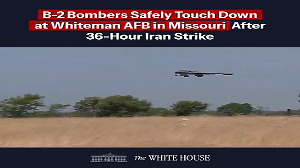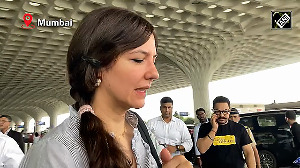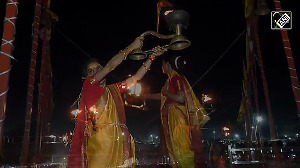The Central Bureau of Investigation on Tuesday moved a Delhi court to obtain a Letter Rogatory to the United States authorities for extradition of former Union Carbide Corporation Chairman Warren Anderson to stand trial for his criminal culpability in the 1984 Bhopal gas leakage tragedy, which had left over 15,000 people dead and maimed several thousands.
In a 33-page application submitted to the court of Chief Metropolitan Magistrate Vinod Yadav, the CBI said Anderson should be extradited from the USA to face trial which is pending against him in the court of the Bhopal chief judicial magistrate.
"Warren M Anderson is liable to be prosecuted on extradition to India for offence under Section 304 of the IPC (culpable homicide not amounting to murder)," said the CBI referring to the extradition treaty of September 14, 1999 between the US and India.
"As per the provision contained in the extradition treaty dated September 14, 1999 between the USA and India, reciprocity has been granted for the extraditable offence punishable for a period of more than one year or by a more severe penalty. The offence involved in under section 304, 326 IPC which entails more than one year imprisonment are covered under the provision of dual criminality as these offences are punishable in India as well as in the USA," the CBI said in its plea.
The CMM decided to hear the CBI plea for Anderson's extradition on Tuesday.
Anderson, 90, has never faced trial for his role in triggering the world's worst industrial disaster over 26 years ago and was declared a proclaimed offender by the court of the Bhopal chief judicial magistrate in 1993.
Arrested on December 7, 1984, within days after the December 1984 tragedy, Anderson was granted bail by a Bhopal court. But he flew back to the US and never returned to India to stand trial in the case.
"The CBI has moved an application in a Delhi court seeking extradition of the then Union Carbide Corporation chairman Warren Anderson in the Bhopal gas tragedy case. The application follows the decision to seek a fresh trial under Section 304 (2) of the Indian Penal Code," said a CBI spokesperson.
The CBI's plea to the Delhi court for issuing Letter Rogatory for Anderson's extradition from the US has come in the wake of Attorney General Goolam E Vahanvati's submission to the apex court in February that if needed, the government may initiate fresh steps to seek his extradition.
India had earlier approached the US for Anderson's extradition in 2003, but the US had rejected the plea in 2004, saying that the provisions of the bilateral extradition treaty between them do not allow his extradition.
The issue of Anderson's extradition had cropped up again after a Bhopal court on June 7 last year convicted Union Carbide India Limited Chairman Keshub Mahindra and six other UCIL employees posted at the multinational's plant at Bhopal and awarded them two-year jail term each.
The meagre punishment for an offence, which had killed over 15,000 people and maimed thousands others, evoked widespread outrage, prompting the Indian government to form a ministerial panel to go into the issue.
As per the ministerial panel's recommendations, the government decided to seek fresh trial of all the seven surviving accused of the Bhopal gas tragedy on stringent charges of culpable homicide not amounting to murder, which entails a jail term up to 10 years as punishment.
Accordingly, the government moved the apex court with a curative petition to seek review of its September 13, 1996 judgment, which had ordered the trial of the accused on milder charges of causing death due to rash and negligent act, which entails a maximum two year jail term.
The apex court had given its ruling, setting aside the lower court's order to put Mahindra and others on trial on the stringent charges of culpable homicide not amounting to murder. The apex court had set aside the trial court order, which had been endorsed even by the Madhya Pradesh high court.
On December 3 last year, the government had moved the apex court seeking enhancement of compensation from Rs 750 crore to Rs 7,700 crore for the victims of the leakage of deadly methyl iso-cyanate gas from the gas chambers of the Union Carbide plant.
For seeking Anderson's extradition, the CBI is also depending upon the prosecution's evidence, proven before the trial court earlier, that the UCC management knew about the Bhopal plant's structural defect, but ignored it in order to cut cost on the maintenance of tanks storing highly toxic material.
During the protracted trial, witnesses had said the maintenance staff had informed the management that the leaking pipes needing urgent replacement. But they were told to minimise repair costs by welding the damaged pipes rather than replacing them.
The management including Anderson has been held responsible for their failure to replace the damaged pipes which allowed water to enter the chemical storage chambers leading to the leakage of deadly methyl isocyanate gas.







